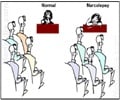Researchers have found evidence that narcolepsy, a disorder that causes periods of extreme daytime sleepiness, is an autoimmune disease.

Writing in their report, published in the journal Science Translational Medicine, the researchers also found a link between the T cells and the H1N1 flu infection of 2009. The researchers found that the T cells that are primed to attack H1N1 pathogens sometimes react negatively with hypocretin and destroy hypocretin-producing neurons.
“This study will shape the next decade of research into narcolepsy. It will focus investigators on immune-mediated mechanisms of neuronal death, which ultimately may shed light on other autoimmune diseases, particularly of the brain. By giving us a new way to think about how neurons in these patients die, it also suggests new therapeutic approaches that we would not have considered if we hadn't learned that this is an autoimmune disease”, Elizabeth Mellins, an immunology researcher and professor of pediatrics at Stanford, said.
Source-Medindia














